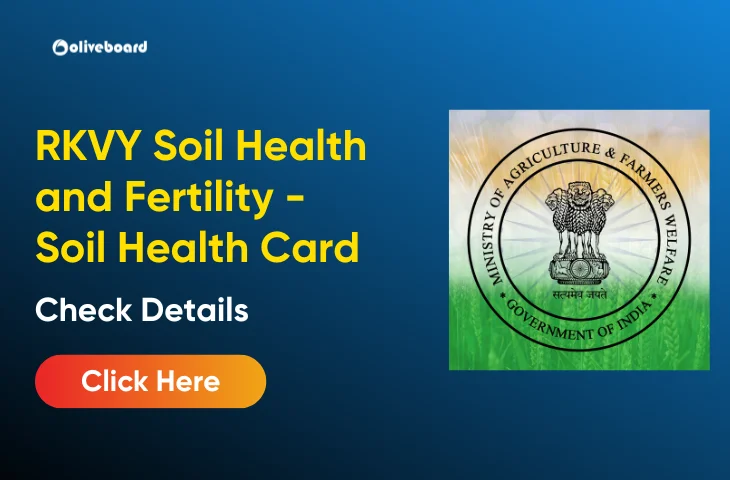RKVY Soil Health and Fertility
RKVY Soil Health and Fertility: The Soil Health Card (SHC) Scheme, a groundbreaking initiative in Indian agriculture, empowers farmers by providing crucial information about the health of their soil. This article delves into the details of the SHC Scheme, outlining its key components, objectives, benefits, eligibility criteria, and the application process.
Overview table of RKVY Soil Health and Fertility
| Aspect | Details |
|---|---|
| Scheme Name | RKVY Soil Health and Fertility |
| Components and Rates | – Soil Collection: Rs 40 – Testing (analysis and chemical costs): Rs 150 – Awareness: Rs 110 |
| Objectives | – Promoting Soil Test-Based Nutrient Management – Issuing Soil Health Cards Nationwide – Strengthening Soil Testing Infrastructure – Capacity Building – Diagnosing Soil Fertility Constraints |
| Benefits | – Free/Affordable Soil Test Access – Timely and Accurate Results – Customized Nutrient Recommendations – Optimizing Fertilizer Use |
| Eligibility | Applicable to all farmers in India |
| Application Process | Step 01: Approach District Agriculture Officer or Block Agriculture Officer Step 02: Assessment of eligibility Step 03: Soil sample collection Step 04: Soil testing and report generation Step 05: Recommendations provided based on results |
| Documents Required | Varies by state; farmers advised to consult relevant authorities for details |
| Conclusion | The Soil Health Card Scheme empowers farmers with crucial information for enhancing productivity and sustainability in agriculture. |
Details of the Soil Health Card Scheme
Farmers can access the Soil Health Card through the SHC portal or via SMS links sent to their mobile phones. The card comprehensively presents the status of the soil across 12 parameters, including macro-nutrients (N, P, K, S), micro-nutrients (Zn, Fe, Cu, Mn, Bo), and pH, EC, OC. Additionally, the SHC offers fertilizer recommendations and suggests soil amendments based on the analysis.
RKVY Soil Health and Fertility Scheme Components and Rates
The scheme entails a nominal cost for farmers, with a detailed breakdown of Rs 300 per SHC. This includes Rs 40 for soil collection, Rs 150 for testing (analyzing soil samples and chemical costs), and Rs 110 for awareness.
Key Objectives of the Scheme
The Soil Health Card Scheme is designed to achieve several vital objectives:
- Promoting Soil Test-Based Nutrient Management: Encouraging farmers to adopt nutrient management practices based on soil tests.
- Issuing Soil Health Cards Nationwide: Ensuring that every farmer across the country receives a Soil Health Card.
- Strengthening Soil Testing Infrastructure: Enhancing the functionality of soil testing laboratories and associated infrastructure.
- Capacity Building: Training district and state-level staff to promote nutrient management practices effectively.
- Diagnosing Soil Fertility Constraints: Implementing standardized procedures for uniform soil sampling, analysis, and designing fertilizer recommendations.
Benefits of the Scheme
The Soil Health Card Scheme aims to provide the following benefits:
- Free/Affordable Soil Test Access: Offering farmers cost-effective access to soil testing.
- Timely and Accurate Results: Providing farmers with timely and accurate soil analysis results.
- Customized Nutrient Recommendations: Offering tailored soil nutrient recommendations based on test results.
- Optimizing Fertilizer Use: Empowering farmers to optimize fertilizer use, minimize input costs, and avoid under- or over-application of fertilizers.
Eligibility
The Soil Health Card Scheme is applicable to all farmers in India, emphasizing inclusivity and accessibility.
RKVY Soil Health and Fertility Scheme Application Process
Offline Process:
- Step 01: Farmer approaches a District Agriculture Officer or Block Agriculture Officer for soil testing and SHC generation.
- Step 02: The concerned officer assesses whether the applicant’s district/village falls under the State Annual Action Plan for SHC generation.
- Step 03: An agent visits the farmer, collects necessary details, geo-tags the land through a mobile app, and takes a soil sample for testing.
- Step 04: Soil testing is conducted on predetermined parameters, and a Soil Health report is generated for the farmer’s land.
- Step 05: The report includes results and recommendations on suitable crops for the soil type, along with the quantity and type of fertilizer to be used.
Documents Required
Document requirements may vary by state. Farmers are advised to consult relevant authorities for detailed information.
Conclusion
In conclusion, the Soil Health Card Scheme emerges as a transformative tool, empowering farmers with essential information to enhance agricultural productivity, reduce costs, and contribute to sustainable farming practices.
Frequently Asked Questions
Ans: The RKVY Soil Health and Fertility Scheme is a significant initiative in Indian agriculture aimed at providing farmers with crucial information about the health of their soil through Soil Health Cards (SHCs).
Ans: The SHC Scheme includes soil analysis across 12 parameters, fertilizer recommendations, soil amendments suggestions, and accessibility through online portals or SMS links.
Ans: The scheme offers benefits such as affordable soil testing, timely and accurate results, customized nutrient recommendations, and optimization of fertilizer use to minimize costs and improve productivity.
Ans: The scheme is applicable to all farmers in India, focusing on inclusivity and accessibility to empower farmers with essential soil health information.
Ans: The application process involves offline steps where farmers approach district or block agriculture officers, undergo soil testing, and receive recommendations based on soil analysis.
- Indian Bank Recruitment 2025 Out for 1500 Apprentice Posts
- Indian Bank Apprentice Salary 2025, Pay Scale, Salary Structure
- Indian Bank Apprentice Syllabus & Exam Pattern 2025, Check Details
- Railway RPF Syllabus 2024, Check Exam Pattern, Topic And Syllabus
- SSC JE vs RRB JE, Which Is Better? Know Detailed Comparison

